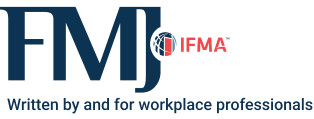Technology
The pressure valve for FMs

Like the rest of the world, the people in charge of managing and maintaining properties have faced unforeseen pressures since the start of the COVID-19 pandemic, whether on the residential or commercial side of real estate. But the global health crisis is far from the first challenge property and facility managers have faced.
Managing properties has always had its challenges, with both tenants and owners looking to property and facility management professionals to deal with a multitude of issues. These encompass everything from a quick and efficient response to maintenance and repairs, adjusting to new rules and regulations, keeping residents and occupants satisfied with the service they receive, maximizing resources, to ensuring premises are COVID-19-safe yet still accessible, while handling the requirements of a full hybrid working environment.
These challenges are placing a strain on FM teams. As a result, managers are increasingly looking for ways to boost efficiency and alleviate the stress of heavy workloads, adopting new property technologies to streamline their operations and ease pressures on them. At the same time, a new generation of FMs is coming in with its own views on how to tackle a changing industry and work environment.
MRI Software this year commissioned its U.K. Voice of the Property Manager Report 2022, looking at key property management trends, challenges, satisfaction levels and how technology is being leveraged to address these issues. The report is based on a survey of almost 300 managers, and examines the issues they face today, how their ranks are changing and the technologies they are adapting to address rapidly evolving circumstances.
The workload & mental pressures FMs face today
The FM’s role is becoming increasingly complex – and the pandemic only accelerated the pace. Cost pressures due to competition and the need to do more in the face of changing conditions post-pandemic – both in homes and workplaces – are pressuring FMs teams to achieve more than ever, often with very limited resources. The upshot is a high-intensity environment.
Overwork emerges in the research as a critical challenge. The survey reveals that a third of U.K. property managers work more than 50 hours a week, and 19 percent are individually responsible for more than 250 properties. Over half (51 percent) see their workload as heavy, with 25 percent admitting to struggling with workload and mental health issues.
Eight percent of the managers surveyed said their single biggest challenge was mental health and the inability to switch off after hours. Even with this issue emerging as a concern, it is interesting to note that only 11.5 percent have recently received mental health or wellness training. This is an issue that the industry must watch going forward – if businesses fail to respond to early signs of potential burnout within their teams, the impact could be severe on everyone concerned.
Adding to the pressure-cooker that many managers feel is impacting their work lives is the task of dealing with aggressive and aggravated owners and tenants. The survey showed that more respondents saw this as their biggest challenge, with 41 percent saying that dealing with frustrated owners and tenants is the toughest part of their job. Keeping up with changing legislation was lower down on the scale, with 16 percent naming it as their biggest challenge, as was dealing with technology – also seen by 16 percent as their primary obstacle.
These findings suggest that, while processes and regulatory compliance are clearly a priority, FMs might feel more comfortable managing these matters than the more emotionally charged area of tenant communications. It also points to tenant relationship management as a high priority for companies.
The technologies easing the pressure
Given the stresses many FMs feel, it is no surprise that they are keen to invest in technologies that could help them work more efficiently. Much of the technology adoption in the FM and maintenance sector today is being spurred by the desire to streamline processes in the face of tight resources, with 41 percent of respondents to the survey seeing efficiency as the driver for new technologies.
Add to the workload challenges the conditions brought about by the pandemic – homeworking, then hybrid working – and the drive toward digital transformation has a sense of inevitability. The report showed investment going into technologies that include property management and accounting (35 percent), resident/tenant portals and apps (33 percent), virtual tours and mobile inspections (33 percent), online leasing and digital leases (29 percent), business intelligence (24 percent), and artificial intelligence or automation (16 percent).
Whether it is to automate critical processes, eliminate the need for duplicate data entry or enable customers to self-serve, investing in new technology is an opportunity to boost the efficiency of working practices, take admin pressure off employees and do more with less. By investing in technologies such as digital self-service and real-time communications portals and apps, FMs can keep up to date with modern consumer preferences – maintaining a high level of customer satisfaction while achieving efficiency and cost savings compared to pre-pandemic manual processes.
After efficiency, business growth was the second-most crucial reason FMs saw to change technology, according to the survey. The research also revealed that cost was not seen as a priority: Only 11 percent of the managers surveyed would change their preferred technology platform for a cheaper alternative, as they are happy to invest in the features they need.
In addition to job pressures accelerating the need for digital transformation, the fundamental demographics in the sector are changing in the U.K., with tech-savvy millennials emerging as the new driving force in property and facility management. This age group now accounts for over 70 percent of all property management roles and close to half (47 percent) of senior positions. Although women are still underrepresented in the U.K. property management sector, making up just over a quarter (27 percent), the good news is that 60 percent hold senior roles – bringing another range of different views to the decision-making process.
As millennials now dominate the industry, it should come as no shock that technology uptake is high. With a generation of managers raised on smartphones, tablets and interactive apps replacing one brought up on paper, landlines and spreadsheets, it is natural that new digital technologies were transforming property management even before the pandemic – which has only speeded things up. Indeed, on average, the respondents to the Voice of the Property Manager survey said they adopted 2.8 new technologies in the previous 18 months.
Looking to a bright tech-driven future
One of the most interesting and heartening findings of the report was that, although many people in the industry see challenges and are looking to improve their work lives with innovative technologies, most are still very satisfied in their careers and happy overall. More than three-quarters (77 percent) of those surveyed said they have a positive outlook on their job – with 80 percent reporting a good work-life balance.
Property and facility management teams face an ever-increasing list of responsibilities driven by seismic industry shifts in recent years, but their outlook remains positive. They are investing in technology and process efficiency at a rapid rate to keep pace with accelerating change and are embracing new tools and working practices that enable them to strengthen their operations. The millennials' belief in technology may play a vital role in their optimism – that and the fact that most may simply enjoy the business they are in.
Looking at where property management is going, the research indicates that managers expect a more flexible, tech-heavy future for their industry and see this as critical to handling challenges like changing legislation, cost pressures and growing resident and tenant expectations.
When asked about the biggest changes they foresee in the next five years, 36 percent of managers anticipate increased flexibility in their work – with advancements and continued investment in the technologies that enable it. Already, 80 percent of respondents are using some form of cloud-based technology that allows them to do many things remotely.
Many also see a future in which there are more self-managed properties, with 20 percent naming that as the biggest change they see in the next five years, while 15 percent expect more tech-enabled properties as the main shift. Most property managers likely see all of these things in their industry’s future and will remain focused on identifying the technology solutions that best suit their internal processes.
Property and facility management professionals are clearly juggling large, sometimes complex, portfolios and often heavy workloads, yet they are generally happy in their work and optimistic about the future. This attitude bodes well for the real estate industry. Looking forward, the research indicates that managers will be much more likely to see industry trends as opportunities rather than threats. This proactive attitude will serve them well as they continue to innovate to meet future challenges.

James Lavery is vice president of marketing (EMEA) at MRI Software, a global leader in real estate solutions. Working with the PropTech industry for almost 20 years, he has worked at MRI Software for the last four and Qube Global Software for over 14 years prior to its acquisition by MRI in 2018. Passionate about B2B technology, Lavery employs his in-depth knowledge of several software and technology markets to better meet MRI Software’s customers’ needs.
Read more on Technology and Leadership & Strategy or related topics Building Systems
Explore All FMJ Topics








